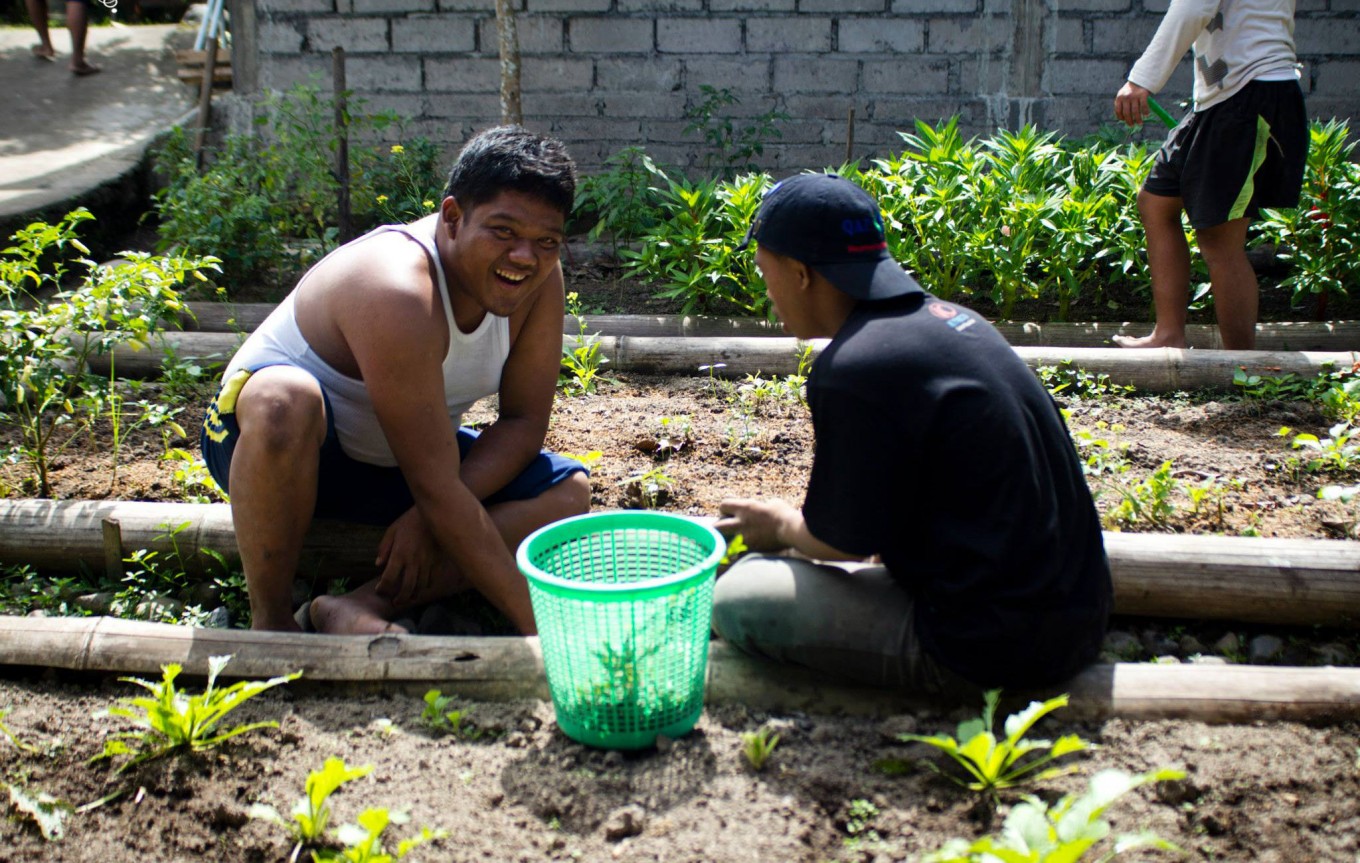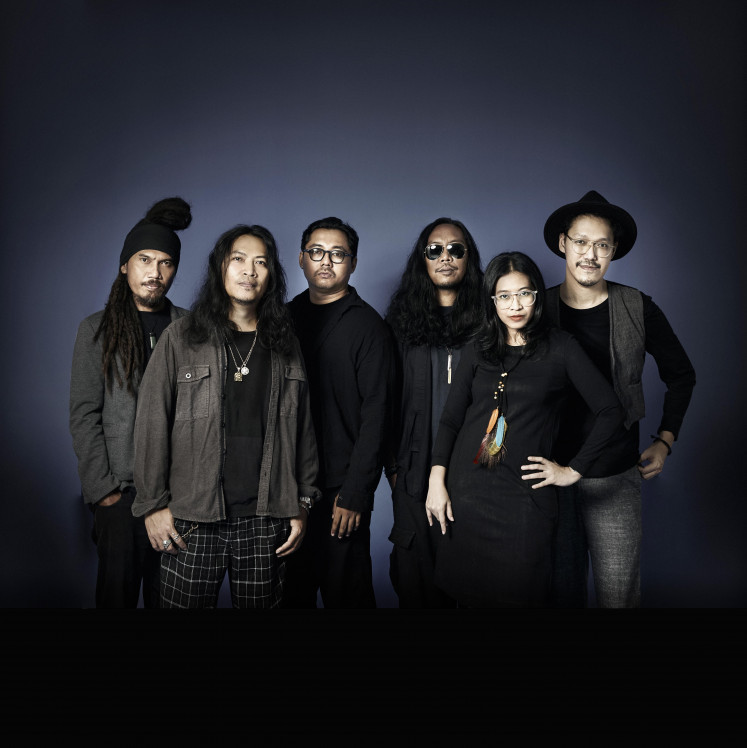Balinese foundation treats autistic children with organic food
According to many local parents, children with very low IQs are not received by Sekolah Luar Biasa (Special Needs Schools). Such children, many with autism and Down Syndrome, have little to no support. This is what inspired Sri Wahyuni and her husband, I Ketut Sadia, to open the Yayasan Widya Guna school 10 years ago.
Change Size
 Today Yayasan Widya Guna provides daily schooling to over 100 students, both disabled and non-disabled. (Facebook.com/Photogravief)
Today Yayasan Widya Guna provides daily schooling to over 100 students, both disabled and non-disabled. (Facebook.com/Photogravief)
“People think that Bali is a paradise, but if you come inside you see it’s a different story,” said Ni Nyoman Sri Wahyuni. For 12 years she has been caring for orphans, autistic children and children with Down Syndrome in Batubulan, Gianyar regency. “Many Balinese believe that these children are cursed, due to bad karma."
According to many local parents, children with very low IQs are not received by Sekolah Luar Biasa (Special Needs Schools). Such children, many with autism and Down Syndrome, have little to no support. This is what inspired Sri Wahyuni and her husband, I Ketut Sadia, to open the Yayasan Widya Guna school 10 years ago.
“These kids are often abused by their parents; their fathers come home drunk and beat them,” she said. “It’s impossible to find teachers; the kids are difficult to deal with, so they stay at home with nothing to do. I’ve seen them wandering around, eating garbage.”
“Parents feel ashamed to have disabled children,” said Sri Wahyuni. She hopes that with new knowledge about autism as a disease, the negative stigma of these kids can be reversed.
(Read also: Autistic artist seeks to inspire through paintings)
Today Yayasan Widya Guna provides daily schooling to over 100 students, both disabled and non-disabled. Besides providing English, exercise and art classes to the children, it also teaches organic farming and promotes a healthy diet among students.
“We’ve received lots of information suggesting that poor nutrition is a factor in developing autism,” said Sri Wahyuni. "Many people who visit want to offer candy to the children, but we don’t allow it.”
The foundation serves meals with lots of vegetables, and tries to not include too many fried foods. Sri Wahyuni says that kids who used to catch colds and the flu rarely fall sick these days. A student with epilepsy, whose parents complained was having three seizures a day, has stopped having seizures completely since he started attending the yayasan.
(Read also: Singapore-led team's study may pave way for drug to treat autism)
Organic produce is a new thing at the market in Bali, and prices can be 10 times higher than conventional fruits and vegetables. Having leased 2000 square meters of land nearby, the foundation have begun growing organic rice, spinach, beans, watermelons and pumpkins.
Construction has just begun on a biogas digester that will turn cow manure into cooking fuel for the kitchen. The digester will also provide a fermented effluent from the waste known as bio-slurry, which can be directly applied as an organic fertilizer. With this cooking gas and bio-slurry, the school hopes to become less financially dependent on its donors.
“Autistic kids can get aggressive, the teachers have to be patient, but if we take the kids into nature they become much calmer,” said Sri Wahyuni. “It’s also stress release for the people who visit, it’s much more relaxing working in a garden than in a bank.”
The Yayasan Widya Guna regularly receives foreign volunteers from the Netherlands, England and Germany, who help out teaching the children. It also offers English classes for local children attending regular schools. In exchange for receiving language tuition, the children play in the foundation's grounds – which includes a small waterfall – and learn about organic farming.
(Read also: Indonesia no place for mentally ill people: Report)
“Not many Balinese understand organic farming,” said Sri Wahyuni. “Our hope is that by having the kids here perhaps they will see what’s happening, and spread the news with their families. We hope we can train some of the economically challenged local kids to build biogas, learn about organic practice, and gain skills.”
Chemical fertilizers and pesticides have become the norm in Bali. Children also are used to eating an unhealthy diet consisting of highly processed, sugary snacks. Sri Wahyuni hopes that parents may become aware that sometimes it is not just karma that can affect their children’s health – their nutrition is also of vital importance.
The safe space for autistic children and children with Downs Syndrome is an encouraging environment. Not only can disabled children be occupied during the day, and receive therapy, but they can also make a positive contribution to their communities through learning about healthy lifestyles.
Who knows, in time, perhaps Bali really will be a paradise – on the surface, and at home.
***
Joshua is a young freelance journalist from England. He specializes in success stories, and has written extensively for the Yayasan Rumah Energi in Indonesia. He loves many things about the world – sustainability, organics, people and traditions – and wants to spread positivity through his work. He can be reached at mail@joshuaparfitt.com.
---------------
We are looking for information, opinions, and in-depth analysis from experts or scholars in a variety of fields. We choose articles based on facts or opinions about general news, as well as quality analysis and commentary about Indonesia or international events. Send your piece to community@jakpost.com. For more information click here.









